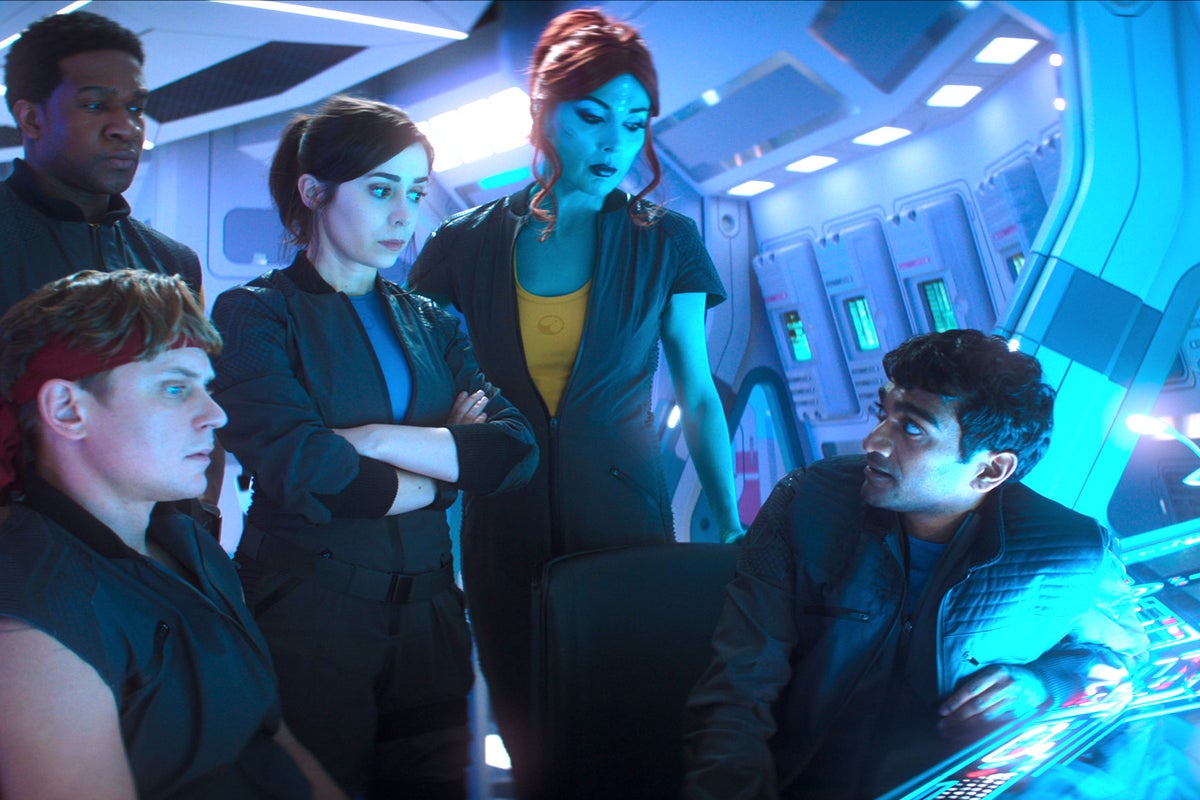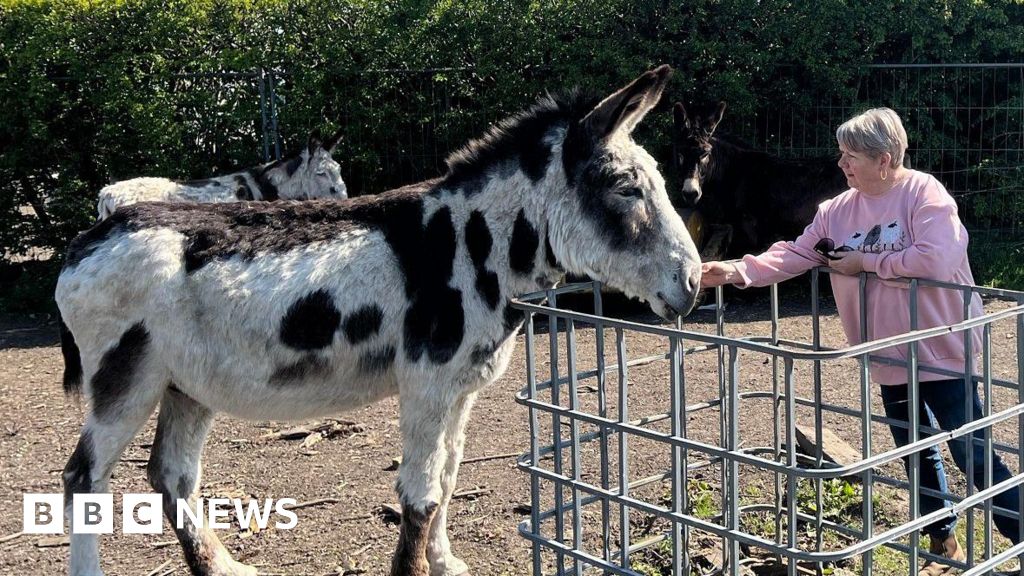A friend recently confessed that he felt Black Mirror had “gone downhill since the episode with the prime minister and the pig.” That episode, “The National Anthem” – in which a fictional PM must perform obscene acts of porcine gratification live on television – captured the zeitgeist perfectly. It was a late watercooler moment for linear TV, back in the days when Charlie Brooker’s pitch-black tech satire was still on Channel 4. It was also, it should be said, the show’s first ever episode. Has it been in perpetual decline ever since?
On the evidence of this latest season, the answer is yes. Once again, the pot-luck nature of the show has given way to an overabundance of bilge. Too many episodes rely on logic-straining mechanics, too few have the emotional sucker punch of “San Junipero” or “Be Right Back”. The horror too, of episodes like “Shut Up and Dance” or “White Christmas”, has given way to a repetitive fear of digital imprisonment. In short, this latest season of Black Mirror just doesn’t carry the same punch that it used to. The crown of television’s best techno-dystopian series, it feels, has been passed to shows like Silo, Squid Game, and, above all, Severance.
Common People ★★★☆☆
Mike (Chris O’Dowd) and Amanda (Rashida Jones) are underpaid and struggling to conceive, yet are still happily married and deeply in love. But their lives change when Amanda is diagnosed with a brain tumour. With conventional medication unable to help her, Amanda’s only chance is to use an experimental procedure pioneered by a tech start-up, Rivermind, which removes the cancerous tissue and replaces it with a synthetic version. “You’re so pretty when you’re alive,” Mike tells Amanda, as he drives her home from the hospital, but soon enough, the perils of signing over a portion of your brain to an avaricious corporation begin to appear.

In essence, “Common People” is about the subscription era, and our reliance on easily depreciated contracts. Amanda’s life-saving package looks good to begin with, but unexpected add-ons – range limits, excess sleeping times, uncontrollable spoken adverts – are used to push her towards a premium scheme. That’s a good target for Black Mirror to set in its sights. But as the narrative progresses, Mike becomes embroiled in a memecoin-style public humiliation livestream, as he struggles to fund Amanda’s care, and the whole thing loses focus and moves inexorably towards tragedy. Good Black Mirror episodes set up a premise and then subvert it, but “Common People” takes an interesting jumping off point and then progresses exactly as you’d anticipate. The ending, in its striking bleakness, feels undeserved.
Bête Noire ★★☆☆☆
Maria (Siena Kelly) designs snacks for a confectionery company. At a taste test for her latest design (a miso jam “hucklebuck”) she notices a woman, Verity (Rosy McEwen), whom she used to go to school with. Verity was the class freak: a computer boffin about whom the popular girls, including Maria, spread a vicious rumour. But now Verity is beautiful and self-assured and inveigles her way into the company. As Verity’s power over their colleagues grows, small things start to destabilise Maria’s reality. “Please stop shouting at me,” Verity whimpers to an even-voiced Maria, as she confronts her, yet her boss appears to unquestioningly believe anything Verity says. What’s going on?

There’s something quite ambitious about the premise, “what if technology could make gaslighting real?”. It scratches at two big issues in society today: the prevalence of domestic abuse and the ability of Big Tech to facilitate harm. And yet, despite that interesting core idea, “Bête Noire” never really knows where to go. Creating the dynamic between two schoolgirl-turned-professional rivals robs it of the impact and urgency that it might’ve had in a more realistic coercive relationship. And the question with Black Mirror is always whether they can stick the landing: in “Bête Noire” the central McGuffin is the sort of thing that Stewie Griffin, the fiendish baby inventor, would’ve cooked up in early episodes of Family Guy. It turns what could’ve been a compellingly political episode into something entirely daft.
Hotel Reverie ★★★☆☆
The golden age of British cinema has passed, but a Hollywood executive (played by Awkwafina) has a plan to revitalise an ageing studio. A new technology will allow an actor to enter the black and white world of a classic film, Hotel Reverie. “Where’s my Casablanca? Where’s my Brief Encounter?” hot American actor Brandy Friday (Issa Rae) yells at her agent. Well, it’s waiting for her in England. And so, she enters the Hotel to re-film a live version of the movie, alongside Emma Corrin’s wistful avatar/actress Dorothy, who played the heroine, Clara, in the original. But quickly the emotional distance required for this exercise gets eroded, and the technology itself proves buggier – and more dangerous – than anyone imagined.
Hollywood is well-known for its cynical repurposing of intellectual property. So, again, this is an area ripe for exploration. Corrin makes for an extremely convincing 1940s screen starlet, even if her chemistry with Rae never really has time to bubble. They don’t quite unlock the longing of David Lean’s star-crossed lovers Alec and Laura, but the whiplash between the modern world of content production (“please don’t call it content,” Harriet Walter’s studio head declares, “it makes me heave”.) and the dreamlike landscape within the old film is effective. Less effective is the attempt to ramp up the stakes by introducing convoluted technological nonsense that puts Brandy’s life at risk. The technology in Black Mirror has to be plausible, otherwise the eye is drawn to the stupidity rather than the moral parable, and “Hotel Reverie” finds this a tricky balance to strike.
Plaything ★☆☆☆☆
An old man (Peter Capaldi) is arrested for attempting to steal a bottle of whiskey. A routine genetic check reveals that his DNA has been found all over an unidentified corpse dug up many years earlier. Who is this mysteriously gentle murderer? Who was his victim? And what role does Colin Ritman (Will Poulter, reprising his role from Black Mirror: Bandersnatch) and the chirruping digital “Throng” have to do with all this? The secret lies in this man’s past as a video game reviewer who found himself the sole owner of what amounts to an avant-garde Tamagotchi. Having dedicated his life to raising this herd of autonomous “thronglets” – “not obscene puppets like Sonic the Hedgehog”, as the man puts it, but cute, mewing digital blobs – what is in store for their final act?
It’s hard to write about “Plaything” with a straight face, and it must’ve been even harder to make it without bursting into embarrassed giggles. It’s just so fantastically stupid, yet played with utter po-faced seriousness. From Capaldi’s lank, greasy wig to the two completely underbaked interrogators assigned to the case, everything has the air of having been hastily cobbled together to fill a scheduling gap. Black Mirror has always been concerned with how much humanity we show towards Artificial Intelligences, but given this subject is also explored, less madly, in “Hotel Reverie’ and “USS Callister: Into Infinity”, it’s hard to imagine what possessed the team to crowbar in this short, deranged slice of digital ham.
Eulogy ★★★★☆
Cantankerous retiree Phillip (Paul Giamatti) lives alone in a house on Cape Cod. When a package arrives asking him to help create an “immersive memorial” for a recently deceased ex-girlfriend, Carol, he finds himself sucked into a world of repressed memories. This “full spectrum memory curation” from a company called eulogy allows Phillip, alongside a guide (Patsy Ferran), to enter and explore photos from his past. Slowly, the time that Phillip spent with Carol – about which he has spent decades stewing – comes back to him, and his eyes are opened to revelations about the truth of their relationship.

The standout episode of this series, “Eulogy”, makes good use of Giamatti’s everyman charms, not to mention a plaintive premise that makes emotional truth, rather than narrative thrills, its driving impulse. The technology itself stays just the right side of plausible, and while the twists and turns are heavily signposted, they feel earned. The production team on “Eulogy” have also taken the time to lovingly evoke hippy culture of the 1970s, as present-day Phillip explores the sepia-tinged, smoke-filled photographs of his formative days. It is an unshowy episode – and not one likely to generate much social media chatter – but it demonstrates that Black Mirror can be more effective when placing the blame on humans rather than technology.
USS Callister: Into Infinity ★★★☆☆
Back in 2017, Black Mirror released an episode called “USS Callister” which followed a group of digitised clones as they were enslaved on a spaceship by Robert Daly (Jesse Plemons), the tyrannical designer of Infinity, a planet-exploring VR game. Following the events of that episode, the crew are now captained by Nanette (Cristin Milioti) and are cruising the simulated galaxy, fighting for survival against savage teenage gamers. “It’s 30 million players versus the five of us,” Nanette reveals. “We are fucked.” And yet, as the net starts to close in on Infinity’s CEO James Walton (Jimmi Simpson) back in the real world, could Daly’s bandits have a chance at a truer freedom?
“USS Callister” is often regarded as one of Black Mirror’s best episodes, creating a strong, female protagonist and not succumbing to excessive despair. This follow-up – the first direct sequel in the show’s history, though several episodes in this series carry notes from previous instalments – picks up the story just months after we last saw it. The continuation is well done, though it adds little to a story that was more evenly told back in 2017. With Daly already dead, “USS Callister: Into Infinity” refreshes its deus ex machinas, inadvertently watering them down in the process. Like so much of Hollywood’s sequel-obsessed culture, this is a perfectly watchable episode, though it feels pointless. And for a show like Black Mirror, which has prided itself on a doomsterish prescience, being pointless might be the worst insult of all.
‘Black Mirror’ season seven is streaming on Netflix from 10 April



